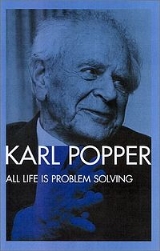
FRS FBA (28 July 1902 – 17 September 1994) was an Austro-British philosopher and a professor at the London School of Economics
. He is regarded as one of the greatest philosophers of science
of the 20th century; he also wrote extensively on social and political philosophy.
Popper is known for his attempt to repudiate the classical observationalist / inductivist
form of scientific method
in favour of empirical falsification
.
You can choose whatever name you like for the two types of government. I personally call the type of government which can be removed without violence "democracy", and the other "tyranny".![]()
Piecemeal social engineering resembles physical engineering in regarding the ends as beyond the province of technology. (All that technology may say about ends is whether or not they are compatible with each other or realizable.)![]()
If we are uncritical we shall always find what we want: we shall look for, and find, confirmations, and we shall look away from, and not see, whatever might be dangerous to our pet theories. In this way it is only too easy to obtain what appears to be overwhelming evidence in favor of a theory which, if approached critically, would have been refuted.![]()
Whenever a theory appears to you as the only possible one, take this as a sign that you have neither understood the theory nor the problem which it was intended to solve.![]()
There is an almost universal tendency, perhaps an inborn tendency, to suspect the good faith of a man who holds opinions that differ from our own opinions. … It obviously endangers the freedom and the objectivity of our discussion if we attack a person instead of attacking an opinion or, more precisely, a theory.![]()
Science may be described as the art of systematic over-simplification — the art of discerning what we may with advantage omit.![]()
I think so badly of philosophy that I don't like to talk about it. ... I do not want to say anything bad about my dear colleagues, but the profession of teacher of philosophy is a ridiculous one. We don't need a thousand of trained, and badly trained, philosophers — it is very silly. Actually most of them have nothing to say.![]()

